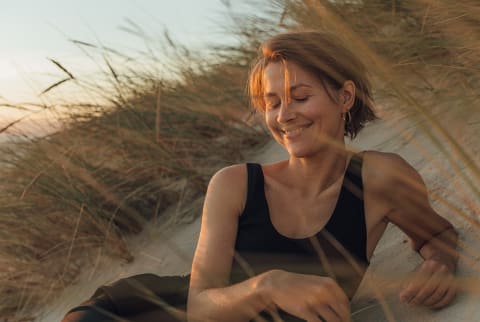5 Rituals That Will Boost Your Health & Help The Planet At The Same Time


We as humans are not separate from the rest of the species on Earth. Flora, fauna, prairies, streams... the cycles and patterns of our planet deeply affect our ways of being. When we have a good relationship with the Earth, we develop a better relationship with ourselves.
To demonstrate this, research has found that taking just 20 minutes to connect with nature1 can help lower stress hormone levels. More data is continuing to prove that spending time in nature supports our overall mental and physical health.
At the same time, we have come to observe the most biodiverse environments contain the cleanest air, water, soil and food. This is because diverse natural compounds can work together to heal their own ecosystems. Humans play a role in this too: human intervention can dramatically speed up transformation. I believe that processes that can take hundreds if not thousands of years can be replicated and sped up with human assistance so that our planet can flourish.
The planet relies on us, the same way that we rely on it.
By repairing our own systems, neighborhoods, and villages, we can observing the miraculous transformation of nature within us and around us. Try these rituals to replenish your body—and the planet—at the same time.
Get grounded (literally)
Grounding is the ritual of putting your bare feet on the Earth for an extended period of time. Grounding, also known as Earthing, allows people to directly connect their bodies with the Earth. Throughout history, Indigenous peoples have talked about the healing energies of our planet. One well-recorded instance of this is in Traditional Chinese Medicine. The term “qi” refers to the life force within us and all around us. When we connect directly with the Earth, we feel better and form a deeper connection with our planet.
Grow your own food
Farming your own healthy, organic food can help you contribute to localized food economies, support the earth, and find a sense of peace. Gardening to support biodiversity, protect local pollinators, and sequester carbon helps to heal the planet while simultaneously giving us a sense of purpose, peace, passion and progress.
Whether your space is a balcony, community garden, or backyard farm, the opportunities for healing are huge.
Volunteer for restoration projects
Restoration projects provide an obvious route towards healing the planet. They could include cleaning up trash on the side or the road, cleaning up the area around waterways, or removing invasive species from wildlife areas. The exercise and movement we get from these projects is good for our health, and it will support healthy ecosystems too.
Surround yourself with natural materials
Using natural building techniques may seem like just an aesthetic choice, but opting for natural, local materials is more sustainable for the planet and our bodies. Homes and structures built using natural materials and methods don’t release as many toxic chemicals into the air we breathe. They’re also often more fire-, flood-, hurricane-, and earthquake-resilient than modern and synthetic structures, providing more safety in the case of natural disasters.
Gather in community
Gathering allows us to come together as a community to advocate for the environment and ourselves. Too often we see festivals and gatherings that leave behind huge amounts of trash, and lots of single-use plastics.
There is a new paradigm shift happening: one that advocates for mindfulness in the way we show up and connect. By going beyond the slogan of “Leave no trace”, we can leave the ecosystem in better condition than before we set foot on it. This mindfulness creates purposefulness and real momentum in our lives, brings connection in our communities, and supports the loving restoration of our home, Earth.
The takeaway
The myth of "wild lands" is just that: a myth. As long as humans have been around, we have shaped our environments. We have always been stewards of the land. It is vitally important to reclaim this important role and remember that we are not separate from nature. We are nature. We have a responsibility to take care of our landscapes, and in return, feel supported by our planet’s abundance.

Eloisa Lewis is a climate scientist and founder of New Climate Culture, a think tank that brings together experts across multiple disciplines to help communities and companies across the globe plan for and remediate climate change. She and her team are focused on designing, building, and rebuilding internal and external structures to be regenerative environments that boost biodiversity and are resilient to disasters.
She is a frequent speaker at global events on topics ranging from decolonizing built environments to the future of psychedelics (The National Psychedelic Conference 2022) to the role of permaculture in preventing natural disasters (Natural Disasters Expo 2023). Lewis has been interviewed by Politico, Yahoo, The Weather Channel, House Digest, Green Entrepreneur, Mother Earth News, and Sustainable Living Radio, among others. She often writes for consumer publications on how individuals can integrate sustainable habits into their daily lives from home gardening to decorating to travel and shopping.
With degree certifications from Harvard and St. Andrews, her passion for the environment has become her business as she and her partners work with communities to rebuild their internal and external structures to be regenerative environments that boost biodiversity and are resilient to disasters.